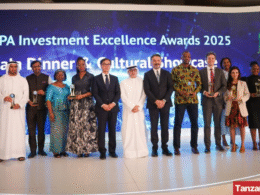A team from the International Monetary Fund (IMF) visited Tanzania on 3rd-13th April 2017 and held discussions with the authorities on how to address the macroeconomic challenges that the mission has identified.
At the end of the visit, Mr. Mauricio Villafuerte, Deputy Division Chief in the IMF’s Fiscal Affairs Department, who led the team, issued a statement, highlighting the IMF’s findings in relation to Tanzania’s recent macroeconomic performances.
GDP Growth
According to Villafuerte “Economic growth, estimated at about 7%, remained strong in 2016. More recently though, the economy has hit a soft patch in the context of slow budget implementation, a slowdown in monetary aggregates and credit to the private sector, and the impact of a drought. These factors are expected to ease in the second half of the year and the growth momentum to strengthen.”
Inflation and Current Account
Villafuerte stressed “Rising food prices have pushed headline 12-month inflation to 6.4% in March 2017. However, core inflation remains well anchored at 2.2%. Good rains in Tanzania’s southern region and easing of drought conditions in its neighbors should relieve pressures on food prices. The external current account deficit is estimated to have narrowed and the Bank of Tanzania’s stock of external reserves remains at a comfortable level.”
Budget Revenues and Spending
“Revenue collections during the 2016-17 fiscal year have picked up over the previous year, although they are likely to fall short of the ambitious target. The level of government spending is likely to fall well short of budgeted levels because of tightly controlled recurrent spending and delays in securing external financing. Thus, there was a small surplus of about a 0.3% of GDP during the first half of the fiscal year, and even with financing constraints easing in the 2nd half of the year, the overall fiscal deficit in 2016/-7 is projected to be 2.5% of GDP, compared to 4.5% in the budget.”
Liquidity in the Banking System
“Liquidity conditions remain tight, but are expected to ease in coming weeks, including through a [Bank of Tanzania] decision to lower the statutory minimum reserve requirement. Furthermore, as the pace of economic activity has slowed down, non-performing loans of the banking system have risen. The mission welcomed the steps the Bank of Tanzania was taking to modernize the monetary policy framework.”
Durig its visit, the IMF staff team held discussions with the authorities on how to address the macroeconomic challenges.
It welcomed the progress in finalizing non-concessional borrowing agreements, which would help budget implementation and advised the authorities to resolve the outstanding issues that would allow it to secure a sovereign credit rating.
The team commended the authorities’ efforts to reorient toward development spending but urged them to avoid accumulating new domestic arrears.
The team also discussed the broad parameters of the 2017-18 budget, noted that spending levels must be underpinned by realistic revenue and financing assumptions, and urged the authorities to address concerns about the payment of VAT refunds negatively affecting exporting companies.
“The team noted that for Tanzania to meet its medium-term growth objectives would require a vibrant private sector and that ample scope remained to improve the business environment. The team welcomed the initiation of the national dialogue with the business community, and encouraged the authorities to ensure that regular exchange of views become the norm”, Villafuerte concluded.
In January 2017 the IMF published its fifth review of its program in Tanzania LINK, indicating that the country faces downside macroeconomic risks that could adversely affect its economic growth.
These risks include the currently tight stance of macroeconomic policies, the slow pace of credit growth, slow implementation of public investment, and private sector uncertainty about the government’s new economic strategies.










